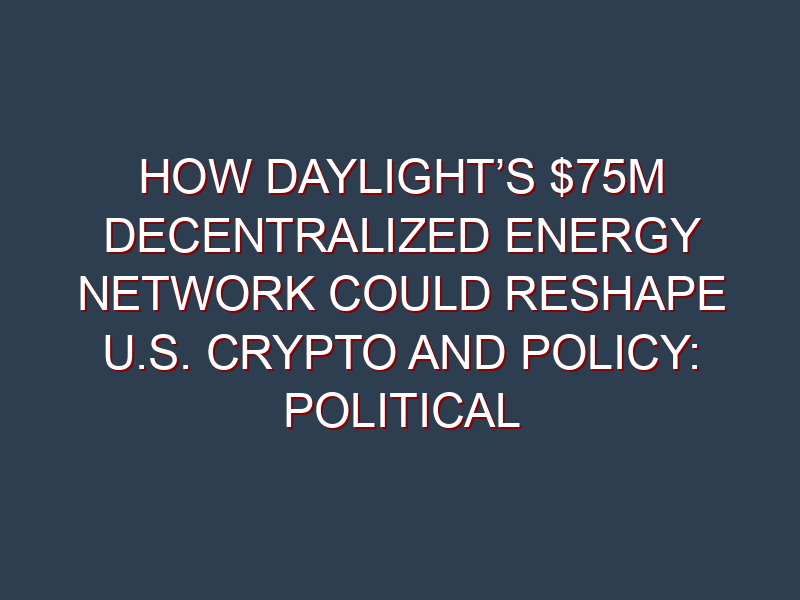Crypto Meets Energy: Why Daylight’s Ambition Is Sparking Political Debate
Daylight’s recent $75 million fundraising round to build a decentralized energy network isn’t just business as usual in the fast-moving world of cryptocurrency. It’s a development with serious political ramifications, putting the Biden Administration and federal regulators squarely in the spotlight as they grapple with how to approach the collision of decentralized finance (DeFi), energy infrastructure, and national interests.
With the U.S. already embroiled in political debates over the regulation of cryptocurrencies and green technology investment, Daylight’s funding success throws new fuel on the fire. Are lawmakers ready for an open, blockchain-powered energy market? Or is this the kind of technological disruption that will provoke a regulatory showdown?
Regulatory Crossroads: The SEC, CFTC, and the Path Forward
More than just an innovation, Daylight’s project is a test case for how Washington wants to referee the blockchain revolution as it encroaches on core infrastructure. The U.S. Securities and Exchange Commission (SEC) and the Commodity Futures Trading Commission (CFTC) are both vying for jurisdiction in the rapidly-evolving digital assets space. But decentralized energy distribution presents headaches that go beyond securities rules or derivatives markets.
Will Daylight’s network be treated as a commodity market, subject to CFTC oversight, or will tokens used to buy and sell power trigger SEC scrutiny as securities? And if this decentralized model scales, will Congress be forced to revisit foundational rules in the Federal Power Act or the 1930s-era securities laws that are suddenly looking outdated?
Green Tech, Crypto, and the 2024 Election Cycle
Political motivations are woven deep into these regulatory decisions. Daylight’s decentralized approach aligns with bipartisan calls for energy resilience and lower costs, but it also challenges powerful vested interests in the traditional utility sector. With green jobs and American innovation high on the campaign agenda, policymakers face a delicate dance: supporting climate-minded advances without ceding oversight over critical infrastructure or triggering unforeseen systemic risks.
Crypto’s ambition to “disrupt everything” now runs directly into the Biden Administration’s push for “responsible innovation” in the digital assets sector—an agenda set forth in last year’s Treasury Department frameworks and newly proposed bills on Capitol Hill.
Policy Risks: National Security, Consumer Protection, and the Pace of Change
Washington’s apprehension isn’t just economic—it’s national security and consumer protection, too. Decentralizing the grid with blockchain raises the stakes for cybersecurity. Who protects consumers from hacks, scams, or grid disruptions in an open marketplace? Will the White House or Congress back new regulatory bodies—or attempt to graft crypto rules onto traditional energy regulators like the Federal Energy Regulatory Commission (FERC)?
The coming months could see Congressional hearings, new regulatory guidance, or a battle for control between agencies. The stakes are high not only for crypto entrepreneurs but also for lawmakers eager to show they’re not asleep at the wheel as digital technology rewrites America’s economic playbook.
Conclusion: A Political Test Case for the Future of Crypto Regulation
Daylight’s $75 million investment round isn’t just about building a new grid; it’s about testing policymakers’ appetite for innovation—and their ability to keep up. As decentralized energy networks move from theory to reality, expect fireworks in Washington and a scramble among agencies like the SEC, CFTC, and FERC to assert authority. The outcome could set the tone for the entire future of digital asset regulation, green technology, and America’s role as a tech leader—or laggard—in the years to come.





